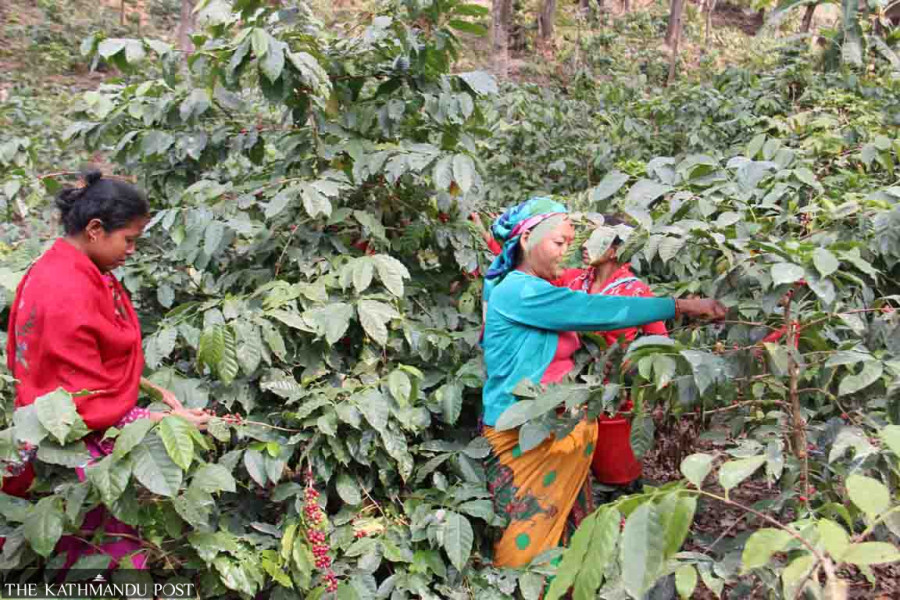Money
Coffee farm yields extra income for farmers in Kavre
According to Khanikhola Rural Municipality, farmers have been cultivating coffee commercially for the past two years in most of the villages.
Jyoti Shrestha
Rajkumar Lama of Khanikhola Rural Municipality in Kavre was dependent on cereal crops until a few years ago which didn’t give him enough income.
For Lama, it was difficult to survive with the production of cereals like maize, millet, and buckwheat throughout the year.
Nowadays, he is happy.
He is making extra income as he has started coffee farming.
Lama has been doing coffee farming for the past four years. He has planted two types of coffee varieties on his six ropanies of land.
“The plant started producing fruits last year,” Lama said.
“The production is good,” he said.
Around 600 kg of cherry beans were produced last year, he said.
"I found that one can generate good income from coffee production. One can earn Rs200,000 annually from the coffee which I learned from last year’s production," he said.
Earlier, farmers used to produce only maize, millet and buckwheat. It used to be difficult to manage household expenses because of the low production. After cultivating coffee, it has become easier to manage household expenses and set aside some money as savings.
"With the good production of coffee last year, it returned a good profit. I was able to save Rs60,000-Rs70,000 after budgeting for the school fees of my children and household expenses,” Lama said.
As demand for coffee grows domestically and globally, farmers’ attraction towards cultivating it has increased.
Stating that technical knowledge is necessary for commercial coffee cultivation, he said that they have been cultivating coffee by observing coffee farming done by others.
“We have gained enough knowledge on coffee farming,” Lama said. “We have proposed technical education on coffee farming which we expect to be addressed soon.”
According to Lama, other farmers of the village have also started coffee farming commercially after observing a good future in coffee farming. He said that out of 90 households in the village, 30 to 40 households have started cultivating coffee.
Sunam Si Lopchan of Khanikhola-1 Hattidada has also been farming coffee commercially for three years. He said that the earnings from coffee farming has helped him improve his living standards.
Lopchan produced 250 kg of coffee from 300 plants last year. He plans to expand his coffee farming acreage further with good earnings.
Smriti Bal of Falametar, Khanikhola-2, has planted 600 coffee plants.
Although it is her initial year in coffee farming, she expects production will be good. She said that coffee cultivation can be improved if there was a good irrigation system and also proper protection.
She said the local-level government also needs to support coffee cultivation. Farmers have not received enough information about coffee cultivation, she said.
“If the rural municipality gives farmers technical knowledge about coffee cultivation, it will be easy to do coffee farming commercially,” Bal said.
In the past few years, farmers’ attraction to coffee farming in Khanikhola village has been increasing.
According to the agriculture division of the Khanikhola Rural Municipality, farmers have been cultivating coffee commercially for the past two years in most places of the village.
Mahesh Kumai, technical assistant of the Agricultural Development Division of the rural municipality said that the production of 35 tonnes of coffee netted farmers Rs20 million in the rural municipality.
In order to encourage farmers to produce coffee, the municipality has introduced a subsidy programme for those who produce it, he said.
He said that through the programme, subsidies were provided to coffee farmers on the basis of production.
For the subsidy programme, the municipality formed seven groups of farmers and distributed the grants.
Kumai said that the subsidy was provided on the basis of Rs35 per kg of coffee produced by the farmers from the group.
He said that for the production of 15 tonnes from seven farmer groups, Rs545,776 was distributed to them.
Indra Bahadur Thing, chairman of the Khanikhola Rural Municipality said that the local level has designed many programmes to attract and encourage farmers in coffee cultivation.
But the rural municipality has not been able to cover everyone in the current subsidy programme.
He said that the local-level government will cover all coffee farmers with an upcoming programme.




 9.83°C Kathmandu
9.83°C Kathmandu















